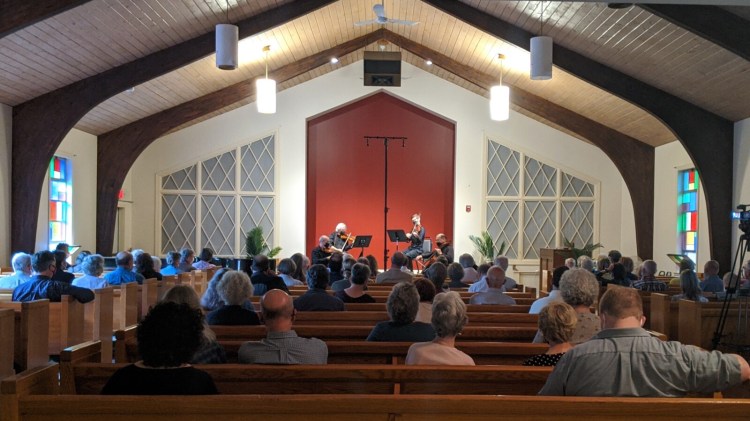Who were those masked men wielding bows? No fear. A Sunday afternoon crowd quickly recognized them as friendly forces.
For its first concert in front of a live audience in well over a year, the Portland String Quartet came ready to play. The foursome presented a varied program that mixed the sublime and the spiritual with a bit of the anxious.
Playing at the new home of the Portland Conservatory of Music at 28 Neal Street in the city’s historic West End, the quartet members – violinists Dean Stein and Ronald Lantz, cellist Andrew Mark and guest violist Matt Consol – offered gracious nods and waves as they took to the multilevel stage at the former home of the Second Parish Presbyterian Church.
First up was the String Quartet Op. 50, No. 3 in E-flat major by Franz Joseph Haydn (1732-1809). One of a set of six “Prussian Quartets” the Austrian composer wrote in honor of King Frederick William II of Prussia, the third is known for containing both classical symmetry and a few Haydnesque “surprises” in its formal development. To contemporary ears, though, the piece feels more playfully inviting than mischievous.
The PSQ nicely developed the lyricism within the second movement in a musical conversation that located how Haydn’s 18th-century masterwork could still move contemporary listeners for its content as well as its overall pristine form.
The second work on the program was the String Quartet in G Major by Florence Price (1887-1953). As Stein noted in a brief introduction, Price suffered under a double cultural burden for being both African American and a woman seeking acceptance as a composer in the insular world of early 20th-century classical music.
Rediscovered in recent years, her work is now being more widely appreciated. In fact, in addition to receiving attention from the PSQ, October concerts by both the Portland Symphony Orchestra and Pacifica Quartet (Portland Ovations) will feature her compositions.
In the Quartet in G Major, the composer blurs the line between an oft-cited late-Romanticism and modalities found in traditional African-American spirituals. The result feels much like an assertive Impressionism capable of gently opening ways toward an ever-broader world of music.
The PSQ embraced the melodicism of the Price piece and executed its beyond-classical rhythmic passages in the service of a soothing spirituality that the composer brought forward from obviously deeply held hopes and dreams.
The final work on the program was the String Quartet No. 1 in E minor by the Czech nationalist composer Bedřich Smetana (1824-1884). Known by the subtitle “From My Life,” this autobiographical work finds the composer of such memorable gems as “The Moldau” musically summing up his life and future under the threat of a loss of hearing.
The work was introduced by violist Consol, whose instrument figures prominently in the piece. He got a chuckle from the crowd by smilingly encouraging them to enjoy the element of regret expressed within the work.
The PSQ tested the fine acoustics of the new venue in a reading of the Smetana piece that, especially after what had preceded it, seemed to sonically jump off the stage and into the lap of the listener. Like the cloud-haunted afternoon sunlight that periodically shown through the hall’s stained-glass windows, the work offered engaging moments of a bright elegance along with an undeniably darker melancholy.
The dance cadences of the middle movements were particularly entrancing as the foursome leaned into the last few turns before the composer’s anxious inclusion of a high-pitched bit of dissonance signaled an uncertain future.
It is comforting to have the PSQ back in person to remind us of the collective vitality to be found within good music played and heard together.
Steve Feeney is a freelance writer who lives in Portland.
Send questions/comments to the editors.


